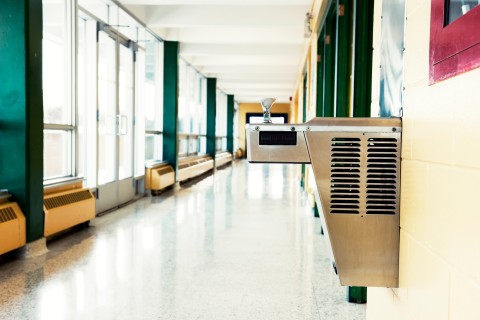In the months after the nation came to a standstill amidst the COVID-19 pandemic, Solid Blend collaborated with government agencies and one of the country’s leading universities to provide testing and remediation for Legionella in several Ohio school districts.

In this two-part blog, we talk with our own Doug Dolder, Case Manager, and recent graduate of the ASSE 12080 Training Program and certified Legionella Water Safety and Management Specialist, about Solid Blend’s recent work in a neighboring school district. The Solid Blend team worked in partnership with Purdue University, West Milton School District, the Ohio Department of Health (ODH), Miami County Public Health, and the Ohio Environmental Protection Agency (Ohio EPA) to ensure safe, potable water for one local school building.
Let’s start with the coronavirus and Legionella: how is it that we’re talking about both at the same time?
With COVID, employers and schools started shutting down, leaving buildings to sit empty for weeks and months. That contributed to water age and left potable water stagnant, leading to conditions that could produce biofilm which houses waterborne pathogens, like Legionella.
Potable water systems are designed for water to be constantly moving through it, making sure that water is coming through every distal outlet regularly – faucets, showers in locker rooms, drinking fountains, ice machines, etc. It’s also important to keep hot water hot and cold water cold to avoid conditions where Legionella can grow. All of that – keeping water in circulation and monitoring temperatures – isn’t likely to happen if a building isn’t in use.
How did this project to test schools for Legionella unfold? How did the multi-agency partnership work, and which agencies were involved?
The entire process was initiated by Milton Union High School. The district’s high school, middle school, and elementary are one large building that was built in 2012. They wanted to be proactive about testing for Legionella because other local school districts had recently found the bacteria in their water systems. But testing and potential remediation was going to be cost-prohibitive for them. They, along with the City of West Milton, reached out to Dr. Andrew Whelton at Purdue University, who agreed to do a wide range of testing.
Dr. Whelton and his team worked closely with the Miami County Public Health Department, the Ohio EPA, and ODH to take more than 1,000 samples for various water safety measurements, not just Legionella.
Solid Blend came on board when the specific testing for Legionella returned as positive. We were recognized by the project team as Ohio’s leader for water management and tasked with remediating the building for Legionella. After remediation, we took post-treatment testing and are expecting to receive results in the coming days. (Watch for the results in Part II of this blog series.)
What unique skills/resources was Solid Blend able to offer in this project?
Recently, [Solid Blend’s] Chris Miller and I graduated as members of the inaugural class of the ASSE 12080 training program offered by the International Association of Plumbing and Mechanical Officials (IAPMO) and Special Pathogens Laboratory (SPL).
It is the first of its kind to provide standardized guidelines and certification concerning opportunistic waterborne pathogens in premise plumbing. Out of 50 graduates in this first training class, two of us were from Solid Blend, and we’re proud of that. Our commitment to continuing education is a community value we consistently put into practice.
What was the timeline for the project?
We participated in a Zoom call with the project team on August 19. Just nine days later, we were performing the remediation. Three days after disinfecting the water system, we took post samples and received an all-clear result on 9/9/2020.

